- Home
- Francine Mathews
Death in the Off-Season Page 13
Death in the Off-Season Read online
Page 13
“Miss Jacoby? The English teacher?”
“Yep.”
“She’s not here.”
“Darn, I thought I’d catch her,” Merry said, and pulled out her keys. “You don’t happen to know where she lives, do you?”
“Actually, yeah, I do,” Will said. “Out at Tom Nevers. Off the Chuck Hollow Road, right around where it intersects Jonathan Lane. She’s got a pink door. But I think she’s sick.”
Merry stopped in the act of opening her car door. “Didn’t she come in today?”
Will shook his head. “It didn’t really matter, since all they do the first day is pass out books and stuff,” he said. “But it was weird. She didn’t even get a substitute—they usually do if they know they’re going to be out.”
Merry nodded thoughtfully, one foot on the car’s doorsill. Then she looked at Will. As usual his fine-boned face was pale, and the dark circles under his beautiful eyes seemed, unbelievably, to have deepened. He must not have slept the previous night. “Want me to run you home?”
He shook his head. “I’ve got the bike. I thought I’d drop by Peter’s and see how the harvest is going.”
The door was closer to old rose than pink. The cottage nestled between two big-shouldered, obviously new houses thrust forward on the Chuck Hollow Road, windows looking blankly south into the Atlantic. Summer people, Merry decided, gone back to the mainland for the winter. Lucy Jacoby’s house would be the only one with lights on these fall evenings, but come spring, the bulk of her absent neighbors’ houses would shield her somewhat from the ceaseless winds. The place looked cozy for a woman living alone.
For a moment, Merry imagined what it would be like to have her own house, an ordered refuge from work, instead of living amid the jumble on Tattle Court. Then she stifled the impulse. She was lucky even to be able to live on the island. Most of the kids she’d grown up with had been priced out of the housing market and had moved to the Cape or Boston suburbs. It was the single ones like her who could stay, taking rooms with aging relatives and clinging to a life that was swiftly vanishing.
She parked the car in front of the house and walked up the drive. A knockoff of a Nantucket lightship basket hung from the door, a few uncollected letters still sitting inside it. She pushed the bell and waited. After about thirty seconds, she pushed the bell again. Perhaps it was out of order. She knocked firmly on the door and listened, holding her breath, for some movement inside. Where was Lucy Jacoby, if not home sick in bed?
She turned and walked back down the path, then stopped and scanned the house, her hands shielding her eyes. No lights shone from the windows on either side of the door. The eaves of the roof sloped down to the first floor; a skylight was cut in the loft space above. The house looked blank and unoccupied. Merry took the path leading around the left side of the house to the yard, hesitated in front of the gate, and then opened it.
The garden was carefully plotted and groomed, with semicircular beds ranged around a center square of roses in riotous bloom. Merry stopped in respect. Roses like these—hybrid teas rather than the hardy island ramblers that covered fences and cottage roofs—were extraordinarily difficult to grow. The damp climate encouraged black spot. She walked over to them slowly and reached out a finger to touch an enormous Peace rose, pink and yellow and cream, awed that something so beautiful could be hidden away behind the house. Lucy Jacoby was either a pro or engaged in a labor of love.
Merry started as a patchwork cat made a four-point landing on the large sundial in the middle of the rose bed, curled its tail around its body, and gazed at her soberly.
“I don’t belong here, do I, but you’re too well-bred to say so.”
The cat flicked one ear and looked away.
“No, you don’t,” a woman replied.
Merry turned. The slight figure standing under the loggia that ran the length of the house took a step backward into the shadows beneath the vines. Merry strained to make out her face. “Miss Jacoby?”
“Of course,” the woman said impatiently. “Who are you?”
“Detective Meredith Folger,” Merry said, walking toward her, “of the Nantucket police.”
Lucy Jacoby turned to the steps leading up to her back door and sat down abruptly. She put her head in her hands.
Merry stopped short. “They said you called in sick today at school,” she said. “You okay?”
“Yes, yes, I’m fine,” Lucy said. She pressed her hands against her head once, briefly, as if adjusting a hat, and then looked up at Merry. “I was—expecting someone else.”
Merry stared at her wordlessly. Expecting? Or avoiding? She had imagined Peter Mason’s sometime girlfriend would reek of off-island elegance—the sort who knew how to assess wine and hoist herself out of a limo without her dress hiking up for the camera; the kind who could attend auctions and bid without anyone knowing she was there. Lucy had all the elements of a beauty, but she was crumpled on her doorstep like an emptied sack.
“I only wanted to talk to you for a few minutes,” she said, “but if now’s not a good time—”
“You’ll come back?” Lucy said, a note of panic in her voice. “No! Just say what you have to say now.”
Merry shifted awkwardly in her Sperrys and glanced around the yard. The crash of surf at Tom Nevers Head came faintly up from the shore, and shades of crimson and orange crept along the horizon to the west. The calico cat arched its back against her bare knees and slid around her leg, meowing soundlessly. Lucy reached for her and pulled her into a huddled lump against her cheek.
“Can we go inside?” Merry asked.
Lucy hesitated, then nodded and stood up. She turned toward the house, holding the screen door open behind her.
The cottage held only two rooms, a small kitchen and an open area that served as living room, dining room, and study. A large easy chair and ottoman facing the fireplace still held the imprint of Lucy’s body. An open bottle of wine and a half-filled glass stood on the end table next to the chair. Against the front wall was a desk cluttered with papers and a computer, and next to it was a wine rack holding about thirty bottles, Merry guessed. She glanced up at the open vault of the ceiling, clear to the second story, and saw skylights cut in the roof on the garden side. The railing of a loft topped the partition to the kitchen: Lucy’s sleeping area, probably. The walls—as in Peter Mason’s study—held shelves of books from floor to ceiling. Merry wandered over to them and scanned the titles while Lucy Jacoby ran a glass under the tap. The Perpetual Orgy: Flaubert and Madame Bovary, she read. Becoming a Heroine. Gilgamesh. In Search of Lost Roses.
“Why’d they send a woman?” Lucy said, as she walked into the room. “Did they think I’d talk to you more easily?”
Merry turned. “Talk about what?”
“Whatever it is you want to know.”
“This is a great house,” Merry said. “Somebody did a terrific job of gutting and renovating the space.”
“Thank you,” Lucy said. She set her glass down on an end table. “Call it therapy. I spent the winter after my divorce tearing out walls. A fitting metaphor, I thought.”
“You did this? Wow.” She scanned the room with respect.
“There’s no end to my ingenuity, Detective. I surprise even myself with what I get away with.”
Merry turned and looked at her.
“Have a seat,” Lucy said. “And say what you came to say.” She remained standing, braced for some onslaught, in the middle of the room.
Merry sat down on the ottoman a trifle gingerly, feeling as though she were perched on someone’s unmade bed. For all its simplicity, the room was a place of richness and wealth. The wool throw on the back of the chair was from Nantucket Looms, as was the deep purple rag rug, and both had cost more than Merry would spend. “I’m told you’re a friend of Peter Mason’s, and I’d like some information about him, if you’re willing to offer
it.”
Lucy stood still for an instant, as if the words she had been waiting for had yet to come. Then she seemed to crumple slightly, and reached for her glass. She took a long drink. “That’s it?” she said. “That’s why you’re here?”
Merry nodded. Lucy closed her eyes, and Merry could almost feel the relief that suffused her body.
“You were expecting something else,” Merry said.
Lucy’s eyes flew open, and a warning flashed for an instant in her face. Then she shrugged and turned to sit in a chair. “I’m sorry, Detective,” she said, “but when you’ve lived with someone as violent as my ex-husband you stop expecting trouble to be somebody else’s problem. Even after five years, I’m afraid of what I’ll hear. Now, what’s happened to Peter?”
“His brother was found dead over at the farm,” Merry said, “and we’re making some routine inquiries of his friends.”
Lucy sat very still, and all expression left her face. “How awful. I must call him right away.”
“He hasn’t told you?” Merry asked.
“Why should he?” Lucy looked as if she were challenging Meredith to say what she was thinking—that it was odd Peter Mason hadn’t sought her out for comfort at his brother’s death. “He must be terribly upset. And death is a family matter first, not something you share with friends.” She smoothed her wild curls; Merry noticed her hands were shaking.
“How long have you known Mr. Mason?”
“Why does it matter?”
“Let’s just say that anything could matter. In fact, it might keep Peter from being murdered.”
“Murdered? But that’s ridiculous. Why would anyone want to kill Peter? And the brother’s death was an accident, surely?”
Merry hesitated. “Rusty Mason—that was his name—was murdered, Miss Jacoby. You can trust me on that. The problem is, he hadn’t been on this island in ten years or so, and there’s a chance he was killed by mistake. We have to work to some extent on the assumption that the intended victim was Peter Mason. That’s why I’m talking to you.”
Lucy took a deep breath and then expelled it, slowly. “All right,” she said. “Shoot.”
Merry pulled her laptop and her half-glasses out of her purse. “Start with when you met,” she suggested.
“Five years ago, the first winter I came to the island.”
Merry looked up, fingers poised to type, and waited. Lucy looked at her steadily and said nothing. Finally she looked away, at the fire, and capitulated.
“We met in the Nantucket Bookworks one dreary February evening, when the light was gone by five o’clock and I was certain I wouldn’t last out the day if I didn’t talk to someone. I threw on something and drove into town, drove anywhere, half-mad because it was an island and I couldn’t get off. If there’d been a ferry running at that hour I’d probably have left everything and never come back. But there was a light coming out of the bookshop. Peter was reading.”
She stopped. Merry hesitated. “And you asked him about the book?” she said.
“The book? What book?”
“The one he was reading. You know, like, ‘Would it appeal to a fan of Gone Girl?’ or something like that.”
Lucy Jacoby smiled faintly. “He was giving a reading, Detective. Of his poems. For an audience. You didn’t know he was a poet?”
“Of course not,” Merry said. “I don’t know anything about him. That’s why I’m here.”
“He’s quite a talent, in fact. Lyric, tortured, very dark; and always—always—impassioned with words. I keep trying to get him for my senior class, but he’s so damnably shy about his work.” She twirled the stem of her glass, an impatient gesture that covered her rapidity of thought. “He only reads during the winter, when the off-islanders have gone home, you know. And as for getting him to publish . . .”
“And so you struck up a conversation?”
Lucy looked down at her hands. “I don’t know if you can understand what I was like that winter,” she said. “I thought nothing could make me whole again. I swung between a giddy euphoria and the blackest gloom. I used to lie awake nights and either thank God I was free—or imagine ways I could kill myself. And then there was Peter, reading, and every word he spoke was a lifeline thrown out to me. I clung to it. I stood by a bookshelf and listened to poem after poem, struck dumb, incapable even of clapping when he finished. Everyone left, in the dribs and drabs of people who really don’t want to go home again, out into the wet. I was more honest. I stayed. He looked up from the papers he was gathering together so carefully with those strong hands of his, and saw my face.” Lucy smiled faintly. “He said, ‘You were listening, weren’t you?’ We’ve been friends ever since.”
Merry shifted uncomfortably, aware that she was out of her depth. “And he never mentioned his brother?”
Lucy started, and shook her head. “I’ve met his sister, George, and the children; but other than his mother he never mentions family. He doesn’t seem to be involved with anyone, either.”
“Involved?”
“Emotionally. Sexually. What you will. There are no women in his life.” Her head was up, daring Merry to ask her why she wasn’t.
“How often do you see Mr. Mason, Miss Jacoby?”
She didn’t hesitate. “Three times a week.”
“Every week?”
“Absolutely. We do interval training together at the high school track on Mondays, Wednesdays, and Fridays. Five o’clock. He rarely misses.”
“Intervals?” said Merry, bewildered. Peter Mason did altogether too much with his time.
“Wind sprints. A quarter mile fast, a quarter mile slow,” Lucy said. “Increases your speed and your distance. Not that I can keep up with him; he just likes the company. And lapping me, of course.”
“I see. Did you run yesterday?”
Lucy Jacoby dropped her eyes and then looked away. She swallowed. “No,” she said. “I couldn’t make it. I left a message to that effect with Rebecca.” Her eyes drifted toward her wineglass and Merry thought she would take a drink, but she restrained herself and leaned forward. “How is any of this likely to help Peter, Detective?”
“His friends might know if he’d been threatened, even if he couldn’t admit it to himself,” she said. “Is there anyone on the island likely to gain from Peter Mason’s death? Anyone who’d be happy if he were injured?”
Lucy pondered the question for several seconds. “I’d be willing to bet there are a number.”
Merry had not expected this. “Really?”
“He’s a Mason, Detective. When you’re as powerful and driving and hungry as that family has been, you breed violence and you attract it in return. If Rusty’s the first to die, they’ve been lucky.”
Merry reflected that the English teacher had a flair for the dramatic. Her gloom probably made for difficult living as well. The cloud of auburn hair curling around Lucy’s face and the lines running from nose to mouth gave her the look of a terrible angel.
“Ms. Jacoby,” Merry said, “where were you Sunday night?”
“What time?”
“Oh, between, say, dinner and breakfast.”
Lucy said nothing for several seconds. “So you think I killed Rusty? Why in God’s name would I?”
“I’m asking where you were that night purely as a matter of routine, Ms. Jacoby. In case you saw or heard something that might help us out.”
“Well, I didn’t,” Lucy said angrily. “If you want to know, I wasn’t even here. I was over on the Cape shopping for clothes at the Labor Day sales.”
“When did you get back?”
“I had dinner, saw a movie, and then caught the Fast Ferry home.”
“The one that gets in around ten p.m.?”
“Yes.”
“Had you parked your car in the day lot?”
“Why does it matter?”
“If you took a taxi, you’d have a witness,” Merry said evenly. Lucy Jacoby’s discomfort made her uneasy.
“My car’s been in the shop for a week,” the woman said. “I rode my bike to Town and I rode it back. I’m sorry that doesn’t suit your purposes.”
“I have no purposes,” Merry said, “only procedures. I’m sorry you’ve been having car trouble. A week sounds serious.”
“The clutch died. No surprise in an eight-year-old American car.”
“One last question,” Merry said. “Peter Mason gave you a birthday gift, I understand. A sweater from Mayling Stern.”
Lucy looked puzzled. “What business is it of yours?”
“Have you lost one of the buttons, by any chance? Perhaps after visiting Mason Farms?”
“I’ve never worn the sweater, Detective.”
“Really.” Merry was startled, and showed it. If she’d owned one, she’d never have taken it off.
“It was the buttons, actually. I have a phobia about rats. I can’t stand them—I never could, even as a child. I gave the sweater away to a clothing drive and didn’t tell Peter. Why are you interested in his sweater?”
“It’s not important. You wouldn’t happen to remember which clothing drive?”
Lucy reached for her wineglass. “Our Lady of the Island,” she said. “For their bazaar. Sometime around the first of August, I think it was. My birthday is July fifteenth.”
Merry took off her glasses and stood up. “Thanks for your time.”
“Not at all,” Lucy said automatically. She looked, however, like a wounded animal. Merry felt vaguely guilty. Lucy led her to the door, and turned, one hand on the knob. “If I can help in any way, don’t hesitate to ask. But do call first before you come out,” she said. “I won my sanctuary, Detective, and I guard it jealously.”
As she drove away, Merry wondered why Lucy Jacoby had no interest in knowing how Rusty Mason died. And what had compelled her to drink so heavily that she had missed the first day of school.
Chapter 14

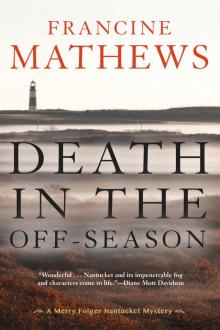 Death in the Off-Season
Death in the Off-Season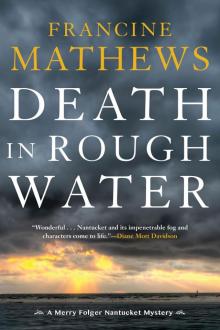 Death in Rough Water
Death in Rough Water The Alibi Club
The Alibi Club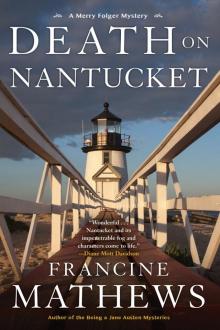 Death of a Wharf Rat
Death of a Wharf Rat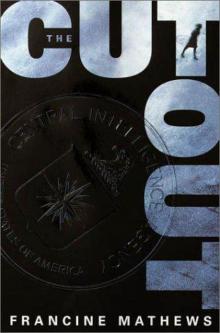 The Cutout
The Cutout The Secret Agent
The Secret Agent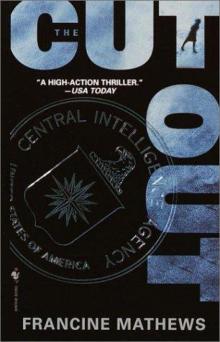 The Cutout cc-1
The Cutout cc-1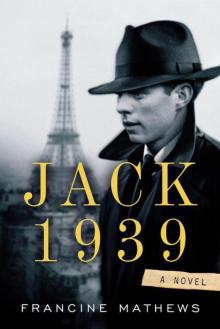 Jack 1939
Jack 1939 Death in a Cold Hard Light
Death in a Cold Hard Light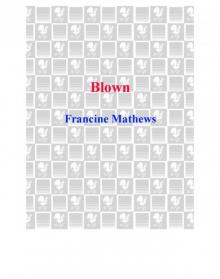 Blown
Blown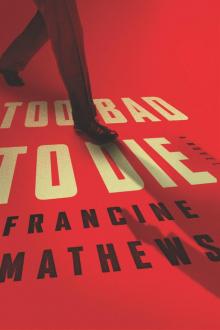 Too Bad to Die
Too Bad to Die